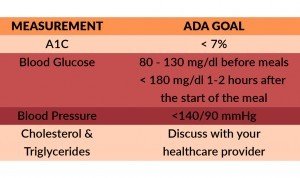Diabetes and Your Heart
 If you are like many people with diabetes, you put a lot of effort into controlling your blood sugar numbers. You watch what you eat, prick your fingers, take your medications and more! But many people with diabetes forget that there are other health numbers that are just as important as blood sugar. These numbers are the ones that deal with the health of your heart.The Diabetes and Heart Disease Connection:Unfortunately, having diabetes at least doubles your risk of heart troubles. There are many possible reasons for this.
If you are like many people with diabetes, you put a lot of effort into controlling your blood sugar numbers. You watch what you eat, prick your fingers, take your medications and more! But many people with diabetes forget that there are other health numbers that are just as important as blood sugar. These numbers are the ones that deal with the health of your heart.The Diabetes and Heart Disease Connection:Unfortunately, having diabetes at least doubles your risk of heart troubles. There are many possible reasons for this.
- High blood sugar may damage blood vessels and alter LDL (bad) cholesterol.
- Even when blood sugar is well controlled, many people with diabetes have problems with blood vessel dilation and have a higher risk of forming blood clots.
- The insulin resistance that characterizes type 2 diabetes affects both blood pressure and blood cholesterol.
Though these are scary-sounding facts, there’s so much you can do to protect your heart. Consistently make smart food and exercise choices. Manage your sleep and stress, and discuss medical management with your healthcare team.The ABCs of Diabetes Care:To help people with diabetes focus on more than blood sugar, diabetes educators often teach the ABCs of diabetes care.
- A1C – A measure of blood sugar control for two to three months
- Blood pressure
- Cholesterol (and triglycerides)
Often people with diabetes put energy into one of the ABCs at the expense of the others. But a healthy future requires you to manage all three. Sadly, less than 20% of Americans with diabetes have each of the three under control.Pictured in this post are the American Diabetes Association’s (ADA) general targets. However, everyone is different and everyone’s diabetes is different, so you must discuss individualized goals with your healthcare team.Healthful, Empowering Behaviors:Get started on some of these healthful, empowering behaviors.
- If you don’t already have the information, call your healthcare provider’s office to learn what your blood sugar targets are. Ask if your blood pressure and cholesterol levels are in control.
- Meet with a registered dietitian nutritionist to develop a personalized eating plan.
- Ask for a referral to a certified diabetes educator to help you understand the results of your blood sugar monitoring.
- Choose more herbs/spices and less salt.
- Choose lower-sodium packaged foods.
- Eat fruits and/or vegetables at every meal and snack.
- Sauté food in cooking oils instead of butter, lard, and other solid fats.
- Eat more vegetarian meals. Eat fish at least twice weekly.
- Take a short walk a couple times per day.
Taking control of all aspects of your diabetes puts you in charge of your health today, tomorrow, next year, and all the years to come.By Jill Weisenberger, MS, RDN, CDE, FANDReferences:
- Diabetes Care http://care.diabetesjournals.org/content/early/2013/02/07/dc12-2258.abstract, http://www.nih.gov/news/health/feb2013/niddk-15.htm
- American Diabetes Association. Standards of Medical Care – 2015. Diabetes Care. (2015) Vol. 338, Supp 1.


